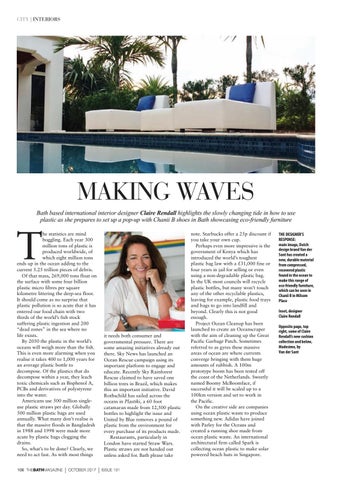At Home in Bath.qxp_Layout 1 22/09/2017 12:50 Page 1
CITY | INTERIORS
MAKING WAVES
Bath based international interior designer Claire Rendall highlights the slowly changing tide in how to use plastic as she prepares to set up a pop-up with Chanii B shoes in Bath showcasing eco-friendly furniture
T
he statistics are mind boggling. Each year 300 million tons of plastic is produced worldwide, of which eight million tons ends up in the ocean adding to the current 5.25 trillion pieces of debris. Of that mass, 269,000 tons float on the surface with some four billion plastic micro fibres per square kilometre littering the deep-sea floor. It should come as no surprise that plastic pollution is so acute that it has entered our food chain with two thirds of the world’s fish stock suffering plastic ingestion and 200 “dead zones” in the sea where no life exists. By 2050 the plastic in the world’s oceans will weigh more than the fish. This is even more alarming when you realise it takes 400 to 1,000 years for an average plastic bottle to decompose. Of the plastics that do decompose within a year, they leach toxic chemicals such as Bisphenol A, PCBs and derivatives of polystyrene into the water. Americans use 500 million singleuse plastic straws per day. Globally 500 million plastic bags are used annually. What many don’t realise is that the massive floods in Bangladesh in 1988 and 1998 were made more acute by plastic bags clogging the drains. So, what’s to be done? Clearly, we need to act fast. As with most things 106 TheBATHMagazine
|
OCTOBeR 2017
it needs both consumer and governmental pressure. There are some amazing initiatives already out there. Sky News has launched an Ocean Rescue campaign using its important platform to engage and educate. Recently Sky Rainforest Rescue claimed to have saved one billion trees in Brazil, which makes this an important initiative. David Rothschild has sailed across the oceans in Plastiki, a 60 foot catamaran made from 12,500 plastic bottles to highlight the issue and United by Blue removes a pound of plastic from the environment for every purchase of its products made. Restaurants, particularly in London have started Straw Wars. Plastic straws are not handed out unless asked for. Bath please take
|
issue 181
note. Starbucks offer a 25p discount if you take your own cup. Perhaps even more impressive is the government of Kenya which has introduced the world’s toughest plastic bag law with a £31,000 fine or four years in jail for selling or even using a non-degradable plastic bag. In the UK most councils will recycle plastic bottles, but many won’t touch any of the other recyclable plastics, leaving for example, plastic food trays and bags to go into landfill and beyond. Clearly this is not good enough. Project Ocean Cleanup has been launched to create an Oceanscraper with the aim of cleaning up the Great Pacific Garbage Patch. Sometimes referred to as gyres these massive areas of ocean are where currents converge bringing with them huge amounts of rubbish. A 100m prototype boom has been tested off the coast of the Netherlands. Sweetly named Boomy McBoomface, if successful it will be scaled up to a 100km version and set to work in the Pacific. On the creative side are companies using ocean plastic waste to produce something new. Adidas have joined with Parley for the Oceans and created a running shoe made from ocean plastic waste. An international architectural firm called Spark is collecting ocean plastic to make solar powered beach huts in Singapore.
THE DESIGNER’S RESPONSE: main image, Dutch design brand Van der Sant has created a new, durable material from compressed, recovered plastic found in the ocean to make this range of eco-friendly furniture, which can be seen in Chanii B in Milsom Place Inset, designer Claire Rendall Opposite page, top right, some of Claire Rendall’s new cushion collection and below, Madesimo, by Van der Sant
